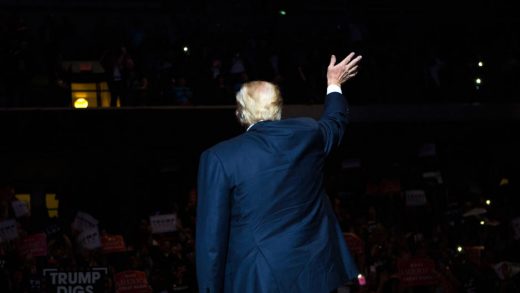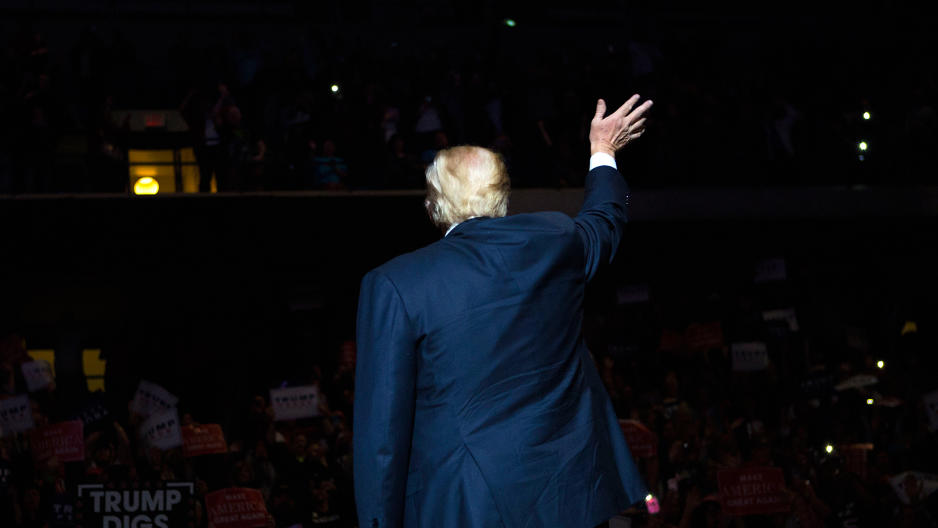How Trump’s Leadership Style Could Play Out In The Oval Office
In the wake of last night’s presidential victory for Donald Trump, one thing that’s still uncertain is what kind of leader he will be. Several pundits, politicians, and psychologists have assessed the president-elect’s temperament and the way that it could play into his leadership style.
Pugnacious Politico
In a cover story for The Atlantic, for example, psychologist Dan McAdams uses “validated concepts in the fields of personality, developmental, and social psychology” to look into Trump’s mind and the influence it has on “his platform, his knowledge of issues, his inflammatory language, his level of comfort with political violence.”
McAdams finds Trump to be extremely extroverted, not terribly agreeable, and a risk taker. As such, he says that “Trump may be a more flexible and pragmatic decision maker, more like Bill Clinton than George W. Bush.” However, couple that with swings between conservative and liberal ideologies, McAdams says, and “Trump may be able to switch positions easily, leaving room to maneuver in negotiations with Congress and foreign leaders.” While he may not shy away from risk, the payoff is more likely to be for his own legacy.
In sum, Donald Trump’s basic personality traits suggest a presidency that could be highly combustible. One possible yield is an energetic, activist president who has a less than cordial relationship with the truth. He could be a daring and ruthlessly aggressive decision maker who desperately desires to create the strongest, tallest, shiniest, and most awesome result—and who never thinks twice about the collateral damage he will leave behind. Tough. Bellicose. Threatening. Explosive.
Trump’s also been compared to Andrew Jackson, the two-term president elected after John Quincy Adams. Often called a “jackass” by his Washington peers (leading to the origin of the Democratic party mascot), Jackson was accused of hating “with a Biblical fury and would resort to petty and vindictive acts to nurture his hatred and keep it bright and strong and ferocious,” according to one biographer. But historians point out that he was able to harness his temper (somewhat) and push through legislation. Overall, his biographer concluded, “Jackson carried the day because opponents were terrified of his temper.”
Andrew Sullivan, writing for New York magazine, extrapolates this to predict how Trump will behave in the White House.
In the coming weeks, Trump will not likely be content to bask in vindication. He will seek unforgiving revenge on those who dared to oppose him. The party apparatus will be remade in his image. The House and Senate will fail to resist anything he proposes—and those who speak up will be primaried into oblivion. The Supreme Court may well be shifted to the far right for more than a generation to come—with this massive victory, he can pick a new Supreme Court justice who will make Antonin Scalia seem like a milquetoast. He will have a docile, fawning Congress for at least four years. We will not have an administration so much as a court.
Is this so farfetched? Consider three things he’s promised to do on his first day in office on ABC’s Good Morning America in February:
First thing is knock out some of the executive orders done by our president. One, on the border where people can pour into (the) country like Swiss cheese. I would knock out Obamacare. Take care of our vets and military. I’ve been very specific in terms of the wall, in terms of Obamacare. I’m very specific on it. I’m a very specific person.
Driven To Distraction?
He may be specific, but Trump has also been described as easily distracted by his Art of the Deal coauthor Tony Schwartz, who has described the process of interviewing him for the book. The level of impatience with various lines of questioning, Schwartz recalled in the New Yorker, was “like a kindergartener who can’t sit still in a classroom.” Schwartz’s experience writing the book for Trump prompted him to say, “I genuinely believe that if Trump wins and gets the nuclear codes, there is an excellent possibility it will lead to the end of civilization.”
Distraction may rule the day—at least in the beginning. As a report in Politico points out: “Trump faces a legal ordeal no president-elect has ever encountered: Juggling defending himself before a jury with preparing for the vast challenges a political novice will face in assuming the presidency.”
There is the class-action case over alleged fraud in his Trump University real estate seminar program that begins on November 28. As this is a civil case, Trump doesn’t have to be there for the whole trial, but he does have to testify, which will take him away from the Oval Office.
Then there are several other suits that Trump has initiated, such as the one against the state of Nevada for leaving polls open too long for early voters, and two suits against chefs who reneged on plans to open restaurants at his new hotel in Washington. Politico’s report also notes that he’s “threatened lawsuits against a dozen or more women who’ve accused him of sexual impropriety in recent months—and several of those women have threatened to countersue if he comes after them.” New York State is also investigating his charitable foundation, while there is a federal investigation into some of his advisers’ ties to Russia.
Trump has already exhibited some quick-footed plays while negotiating a long and arduous campaign. And it’s not his first rodeo when it comes to doing the unprecedented. That’s why it’s no surprise that he released a shortlist of potential replacements for the late U.S. Supreme Court Justice Antonin Scalia back in August to play to conservatives. Among them, the conservative Utah Senator Mike Lee (who refused to endorse Trump).
What’s becoming more clear as the results of this election sink in is that Trump’s style, combined with traditional political protocol, can facilitate a virtually unopposed agenda. Former Republican detractors are stepping up to support him, as have both Hillary Clinton and President Obama. For his part, during his acceptance speech early Wednesday morning, Trump pledged to “deal fairly with everyone, all people, and all nations.” We the people can only hope his leadership style will allow him to make good on that promise.
Fast Company , Read Full Story
(48)














